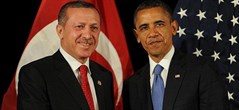
Under Prime Minister Erdogan, Turkey became directly involved in the Syrian crisis as his support for the Muslim Brotherhood brought an ideological context to Turkey’s hostile stance against Assad’s government.
At the beginning of 2011, continuing protests against Assad finally led to the end of the 48-year state of emergency in Syria and an amnesty for political prisoners, not without US and EU pressure. But several months later a well-known US whistleblower Sibel Edmonds claimed that the US and Turkey have been giving logistic aid and military training to the Syrian armed opposition since “April-May 2011”. Edmonds even declared that the US Air Force base in İncirlik (Turkey) was used as a training facility for the so-called Free Syrian Army and other opponents of the Damascus regime – in her own words, “the dissident base in Syria.”
In June 2011, the Assad government declared that 120 members of its security forces were killed by “armed gangs” in the northwestern town of Jisr al-Shughour, located about 16 kilometers from Turkey’s Hatay region. Assad’s troops laid siege to the town and more than 10,000 people subsequently fled to Turkey.
Since then reports have surfaced that Libyan fighters from Misrata went to Syria in an effort to support attempts to overthrow Assad. In addition, rumors equally abounded about Saudi Arabia and Qatar’s mobilization of jihadist fighters to undermine the Baath regime in Syria. Turkey’s Prime Minister Recep Tayyip Erdoğan has been vocal in his condemnation of Bashar al-Assad, ever since the outbreak of hostilities in Syria.
In spite of the Turkish government’s current belligerent stance on the Damascus regime – be it in the form of a “covert” war or as providing mere “logistic aid and military training” – in the early years of its AKP government, “Turkey proved instrumental in breaking Syria’s international isolation, which paved the way for Assad’s visit to France in 2005. In 2007, a free trade agreement between Turkey and Syria boosted the bilateral trade volume from $796 million in 2006 to $2.5 billion in 2010. In 2008, Turkey even brokered peace talks between Syria and Israel. While the following year, Ankara and Damascus abolished the visa regime, thus far hampering the free movement of people and products between both countries.”
As a result, one can but wonder about the reasons behind Erdoğan’s sudden change of heart. These political interactions took place against the backdrop of Turkey’s growing economic clout. Turkey was quite successful on the international front, promulgating Foreign Minister Davutoğlu’s principle of “strategic depth” and his much-vaunted “zero problems policy”.
Read the rest of the article.

